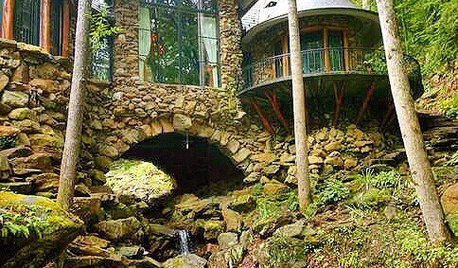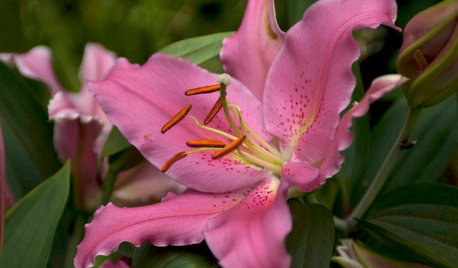Urine..Is this true?
meyermike_1micha
14 years ago
Related Stories

BATHROOM DESIGNShould You Install a Urinal at Home?
Wall-mounted pit stops are handy in more than just man caves — and they can look better than you might think
Full Story
FUN HOUZZ31 True Tales of Remodeling Gone Wild
Drugs, sex, excess — the home design industry is rife with stories that will blow your mind, or at least leave you scratching your head
Full Story
HOUZZ TOURSHouzz Tour: New Love and a Fresh Start in a Midcentury Ranch House
A Nashville couple, both interior designers, fall for a neglected 1960 home. Their renovation story has a happy ending
Full Story
FLOWERSGreat Design Plant: Lilies
Try these delightfully exotic stunners for paintbox colors, deep fragrance and intricately detailed petals
Full Story
HOMES AROUND THE WORLDHousehold Habits and Customs to Borrow From Other Countries
Discover why salt may be the perfect house-warming gift, how to clean rugs in snow and why you should invest in a pair of ‘toilet slippers’
Full Story
SELLING YOUR HOUSEHow to Decorate for the Holidays When Your Home Is for Sale
You can make your home appealing to potential buyers and still celebrate the season. Here are 7 tips to keep in mind
Full Story
MOST POPULAR12 Key Decorating Tips to Make Any Room Better
Get a great result even without an experienced touch by following these basic design guidelines
Full Story
FURNITUREGreat Vintage Find: Antique Sewing Tables and Cabinets
These history-rich pieces add unique style and function all over the house
Full Story
MAN SPACESA Los Angeles Basement Becomes a Cozy Man Cave
Raw storage space in a Hollywood writer's home is transformed into a masculine home office hybrid
Full Story
HOUSEKEEPINGDon't Touch Another Stain Before You Read This
Even an innocent swipe with water may cause permanent damage. Here's what to know about how rugs and fabrics react
Full Story






jodik_gw
justaguy2
Related Professionals
Edmond Landscape Contractors · Maple Valley Landscape Contractors · Bethel Park Landscape Contractors · Concord Landscape Contractors · East Patchogue Landscape Contractors · Welby Landscape Contractors · Reisterstown Landscape Contractors · East Norriton Landscape Contractors · Bell Gardens Solar Energy Systems · DeLand Window Contractors · Lemont Window Contractors · Kansas City Fence Contractors · Oceanside Fence Contractors · Simi Valley Fence Contractors · Sunrise Manor Fence Contractorslinchat
saldut
meyermike_1michaOriginal Author
jodik_gw
yellowthumb
rdak
greenman28 NorCal 7b/8a
colokid
jodik_gw
buzzsaw8
yellowthumb
gemini_jim
tapla (mid-Michigan, USDA z5b-6a)
jodik_gw
KatyaKatya
tommyr_gw Zone 6
greenman28 NorCal 7b/8a
tapla (mid-Michigan, USDA z5b-6a)
jodik_gw
jodik_gw
suddensam
tommyr_gw Zone 6
meyermike_1michaOriginal Author
TwoMonths
greenman28 NorCal 7b/8a
emgardener
jojosplants
gemini_jim
jodik_gw
gemini_jim
emgardener
jodik_gw
jmsimpson9
greenman28 NorCal 7b/8a
onafixedincome
mrlike2u
jodik_gw
andrewofthelemon
faroq
Joe1980
jennq
Joe1980
dowbright
tapla (mid-Michigan, USDA z5b-6a)
jodik_gw
daniel-1
chilliwin
Steve W